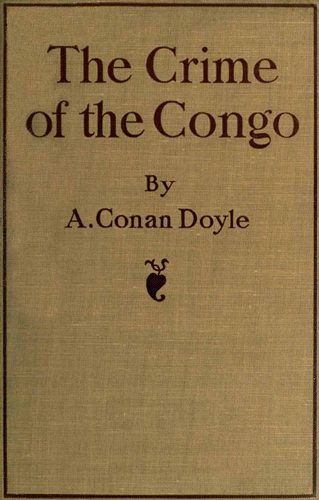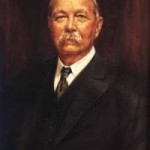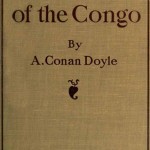I will now return to the witnesses of the shocking treatment of the natives. Rev. Joseph Clark was an American missionary living at Ikoko in the Crown Domain, which is King Leopold’s own special private preserve. These letters cover the space between 1893 and 1899.

This is Ikoko as he found it in 1893:
“Irebo contains say 2,000 people. Ikoko has at least 4,000 and there are other towns within easy reach, several as large as Irebo, and two probably as large as Ikoko. The people are fine-looking, bold and active.”
In 1903 there were 600 people surviving.
In 1894 Ikoko in the Crown Domain began to feel the effects of “moral and material regeneration.” On May 30th of that year Mr. Clark writes:
“Owing to trouble with the State the Irebo people fled and left their homes. Yesterday the State soldiers shot a sick man who had not attempted to run away, and others have been killed by the State (native) soldiers, who, in the absence of a white man, do as they please.”
In November, 1894:
“At Ikoko quite a number of people have been killed by the soldiers, and most of the others are living in the bush.”
In the same month he complained officially to Commissaire Fievez:
“If you do not come soon and stop the present trouble the towns will be empty…. I entreat you to help us to have peace on the Lake…. It seems so hard to see the dead bodies in the creek and on the beach, and to know why they are killed…. People are living in the bush like wild beasts without shelter or proper food, and afraid to make fires. Many died in this way. One woman ran away with three children—they all died in the forest, and the woman herself came back a wreck and died before long—ruined by exposure and starvation. We knew her well. My hope in 1894 was to get the facts put before King Leopold, as I was sure he knew nothing of the awful conditions of the collection of the so-called ‘rubber tax.’”
On November 28th he writes:
“The State soldiers brought in seven hands, and reported having shot the people in the act of running away to the French side, etc.” “We found all that the soldiers had reported was untrue, and that the statements made by the natives to me were true. We saw only six bodies; a seventh had evidently fallen into the water, and we learned in a day or two that an eighth body had floated into the landing-place above us—a woman that had either been thrown or had fallen into the water after being shot.”
On December 5th, he says:
“A year ago we passed or visited between here and Ikoko the following villages:
Probable population Lobwaka 250 Boboko 250 Bosungu 100 Kenzie 150 Bokaka 200 Mosenge 150 Ituta 80 Ngero 2,000 Total 3,180 “A week ago I went up, and only at Ngero were there any people: there we found ten. Ikoko did not contain over twelve people other than those employed by Frank. Beyond Ikoko the case is the same.”
April 12th, 1895, he writes:
“I am sorry that rubber palavers continue. Every week we hear of some fighting, and there are frequent ‘rows,’ even in our village, with the armed and unruly soldiers…. During the past twelve months it has cost more lives than native wars and superstition would have sacrificed in three to five years. The people make this comparison among themselves…. It seems incredible and awful to think of these savage men armed with rifles and let loose to hunt and kill people, because they do not get rubber to sell at a mere nothing to the State, and it is blood-curdling to see them returning with hands of the slain and to find the hands of young children, amongst bigger ones, evidencing their ‘bravery.’”
The following was written on May 3rd, 1895:
“The war on account of rubber. The State demands that the natives shall make rubber and sell same to its agents at a very low price. The natives do not like it. It is hard work and very poor pay, and takes them away from their homes into the forest, where they feel very unsafe, as there are always feuds among them…. The rubber from this district has cost hundreds of lives, and the scenes I have witnessed while unable to help the oppressed have been almost enough to make me wish I were dead. The soldiers, are themselves savages, some even cannibals, trained to use rifles and in many cases they are sent away without supervision, and they do as they please. When they come to any town no man’s property or wife is safe, and when they are at war they are like devils.
“Imagine them returning from fighting some ‘rebels’; see, on the bow of the canoe is a pole and a bundle of something on it…. These are the hands (right hands) of sixteen warriors they have slain. ‘Warriors!’ Don’t you see among them the hands of little children and girls (young girls or boys)? I have seen them. I have seen where even the trophy has been cut off while yet the poor heart beat strongly enough to shoot the blood from the cut arteries to a distance of fully four feet.”
“A young baby was brought here one time; its mother was taken prisoner, and before her eyes they threw the infant in the water to drown it. The soldiers coolly told me and my wife that their white man did not want them to bring infants to their place. They dragged the women off and left the infant beside us, but we sent the child to its mother, and said we would report the matter to the chief of the post. We did so, but the men were not punished. The principal offender was told before me he would get fifty lashes, but I heard the same mouth send a message to say he would not be flogged.”
Compare with this the following extracts from King Leopold’s Officiel Bulletin, referring to this very tract of country:
“The exploitation of the rubber vines of this district was undertaken barely three years ago by M. Fievez. The results he obtained have been unequalled. The district produced in 1895 more than 650 tons of rubber, bought (sic) for 2½d. (European price), and sold at Antwerp for 5s. 5d. per kilo (2 lbs.).”
A later bulletin adds:
“With this development of general order is combined an inevitable amelioration in the native’s condition of existence wherever he comes into contact with the European element….
“Such is, in fact, one of the ends of the general policy of the State, to promote the regeneration of the race by instilling into him a higher idea of the necessity of labour.”
Truly, I know nothing in history to match such documents as these—pirates and bandits have never descended to that last odious abyss of hypocrisy. It stands alone, colossal in its horror, colossal, too, in its effrontery.


